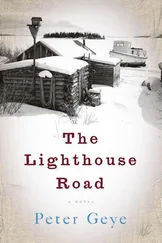“How much more do you need?” Noah asked, looking around at what seemed an unending supply of wood.
“It needs time to cure. That pile there”—Olaf pointed at a four-foot-tall by eight-foot-deep pile of split wood as long as Noah’s rental car sitting beside the shed—“it won’t be ready until next year.”
“It won’t burn?”
“Of course it’ll burn, just not very well.”
Noah jerked the maul free of the stump. He swung it up onto his shoulder.
“There are a couple of trees down in the gulch. They blew over this spring. One’s an oak, the last on the lot, I think. I’d like to get them up here before it snows.”
“We can do that.”
Noah measured the distance between the log on the block and the head of the maul in his extended arms, swung the handle over his right shoulder, and let the steel head fall square on the balanced log. The wood split with a clap, and the two pieces landed four feet away on either side of the stump.
“We’ll get the city boy out of you yet,” Olaf said.
“That felt good,” Noah said, still feeling the reverberations in his shoulders.
“Let’s get at that oak,” Olaf said.
“All right.”
They emptied the wheelbarrow in the yard, and Olaf fetched a chainsaw, a gas can, and two pairs of gloves from the shed. They started toward the gulch, Noah in front and pushing the wheelbarrow.
“I called Solveig,” Noah said over his shoulder. The wheelbarrow bounced over the roots and pine saplings that had overrun the path. “I left her a message.”
“What are you talking about?”
“I mean, she ought to know what’s going on.”
“Aaah,” Olaf grumbled. “What does she need to hear about it for?”
“Maybe,” Noah said, setting the wheelbarrow down and turning to face him, “she just deserves to know. Maybe she would want to know because you’re her father, after all, and people tend to worry when their father is sick.”
“Do me a favor and don’t call her again. She doesn’t want to see me like this.”
Noah took a deep breath and rolled his neck over his shoulders. He turned back for the wheelbarrow.
They followed the path slowly for another five minutes before they reached the oak, which had fallen across the whole expanse of an old creek bed so that it formed a kind of bridge between the two sides. The sinewy roots hung like dead willow branches on the other side of the ravine.
“Must have been some wind,” Noah said.
Olaf agreed. He explained the chainsaw, said it’d be easiest to work on the branches first, that he should approach the job as if he were whittling a stick. He warned Noah about how, when cutting off a particularly large branch — and he pointed out half-a-dozen examples — he had to be careful because the tree’s balance might shift. Finally he pulled the cord and the saw fired up. He handed it to Noah. Olaf sat down with his long legs hanging over the edge of the gulch and pointed at Noah to get going.
The saw whined with the first squeeze of the trigger, pulling Noah toward the tree. He trimmed the first branches, the finer treetop limbs still thick with dried leaves. He ripped through them, moving quickly, the branches falling into the gulch, until he had worked halfway down to the thicker limbs. After fifteen minutes he looked back at the pile of branches lying on the bank of the gulch. The air smelled of sawdust, and his ears rang from the shrill saw.
He kept at it until the only thing left was the spotted trunk spanning the two sides of the creek bed. Olaf sat there, his shoulders draped over his chest, his hands folded on his lap, like a child. Noah flipped the power switch and the saw choked off. The muscles in his arms and back stung and twitched.
“Oh-hohh!” Noah hollered. The air had gone silent when he turned off the saw, but his ears still buzzed. “That’s work!”
Olaf smiled.
“Now what, just start on the trunk?”
“We’ll leave that for tomorrow. It’s getting dark.” Olaf turned his attention to the sky. “The days are so goddamn short this time of year,” he said.
Noah looked back at the tree, wanted to continue but said, “You know best.”
They left the wheelbarrow and started back for the house.
They were almost to the cabin when Noah saw something moving close to the ground in the yard. It had crawled out from under the truck. Noah flinched, dropped the saw on a pathside rock, and froze. “What the hell is that?” he whispered.
“What?” Olaf said, startled himself by the thud of the saw on the stone.
“That,” Noah whispered again, pointing at the bushy shadow. “Is that a wolf?” he asked. He bent down and picked up the saw. “Is that a goddamn wolf?” he asked again, this time in a louder whisper, turning his head but not taking his eyes off the shadow in the yard.
“What are you talking about?” Olaf said.
“There. Sitting right there, by the firepit.”
“That’s not a wolf,” Olaf said, elbowing Noah aside. “That’s my dog. That’s Vikar — come here, Vikar.” And he whistled. The dog came bounding around the truck and ran a circle around them.
“Jesus Christ,” Noah said, all of his held breath coming out in one relieved rasp. “Jesus,” he said again, watching the huge dog roll on his back as Olaf scratched its stomach. “Where has he been?”
“Wandering around the woods, I’d guess. Comes home when he wants. Must’ve heard the chainsaw.”
The dog was enormous, a malamute or husky a hundred and fifty pounds or more. It had long, coarse hair and ears and forepaws the size of Noah’s own hands. “He scared the shit out of me,” Noah said. “I thought it was a wolf.”
“That’s what you said.”
Noah let the dog sniff his hand.
“How long have you had him?” They were standing in front of the house now, the dog jumping and twisting under Olaf’s snapping fingers.
“Couple years.”
Noah sat on the step and the dog came up to him, eye level, ears submissively fallen, to be petted. “Any more surprises?” he asked, scratching the dog behind its ears.
“Surprises?” Olaf replied. He stepped behind Noah, onto the porch, took the top off a tin garbage can, and filled an empty ice-cream bucket with dog food. He put it down beside the steps and the dog set to eating.
“DO YOU REMEMBER your mother playing the piano?” They sat in the rusted steel lawn chairs on the grassy beach, an oar’s length from the lapping water, darkness cascading down the sky. Vikar lay at Olaf’s feet, his legs outstretched, a stream of groans muttering from his black lips.
“Of course I do,” Noah said.
“She played beautifully.”
“It used to drive me nuts.”
“Why?” Olaf asked, his chin on his shoulder, his long white beard pointing out toward the lake.
“Because I could never listen to my records.”
She used to play the Acrosonic upright for hours at a time, in summer especially, when her long evenings alone went on endlessly. Mendelssohn, Beethoven, and Grieg were always drifting through the house on High Street while Noah and his buddies pitched pennies outside against the garage door. Solveig played, too, in her mother’s style but without any of her elegance.
Olaf was teasing a sprig of brown grass. He sighed, cleared his throat, and put the grass between his lips. “She always wanted to play at your wedding.”
“My wedding,” Noah said, stiffening at the mere mention of it. “I’m surprised you’d bring it up.”
“That was a long time ago, Noah.”
“Five years now,” Noah said, feeling his anger rising. His father’s worst performance ever had come on the eve of Noah’s wedding. He hated to remember it. And here was talk of his mother again, Noah’s sacred subject.
Читать дальше












